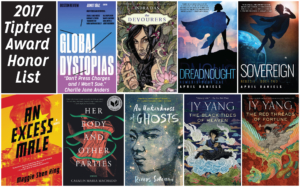 Congratulations to Virginia Bergin, who has won the 2017 Tiptree Award for her novel Who Runs the World? (Macmillan, UK, 2017). (The novel will be published in the US in November 2018 under the title The XY (Sourcebooks, 2018).
Congratulations to Virginia Bergin, who has won the 2017 Tiptree Award for her novel Who Runs the World? (Macmillan, UK, 2017). (The novel will be published in the US in November 2018 under the title The XY (Sourcebooks, 2018).
About the Winner
Who Runs the World? is a young adult novel that tells an intricately layered tale of intergenerational struggle and cooperation, the dehumanizing force of gender stereotypes, and the moral courage it takes to challenge cultural and political norms. Bergin invokes a premise familiar in feminist science fiction—a plague that kills nearly everyone with a Y chromosome. Without relying on biological determinism, Bergin uses this premise to develop a vividly imagined feminist society, and to grapple with that society’s changes and flaws over time.
Born three generations after the plague, into a social order rebuilt around consensus, 14-year-old River views her world as idyllic––until she discovers Mason, a teenage boy who has escaped from one of the “Sanctuaries” where “XYs” are held. As River, along with her mother and grandmother, learns about the violence of Mason’s life, she sees her community’s norms upended and hidden biases exposed. But the story does not end with the exposure of the seeming utopia’s hidden subjugations. For River has been shaped by a society that built itself with purpose and care around principles of justice. Growing up amid those principles has given River the tools to challenge her own culture’s fundamental contradictions. In an ultimately optimistic vision, Bergin dares to depict a future in which principles of transformative justice can have, if not victory over, at least even footing with the incentives of profit and exploitation.
At WisCon 42, the introduction and celebratory song and materials for the Tiptree winner contained language suggesting the novel portrays a trans-exclusionary view of gender. The Motherboard wrote a note of apology, which you can read at this link.
About the Honor lISt
 In addition to selecting the winners, the jury chooses a Tiptree Award Honor List. The Honor List is a strong part of the award’s identity and is used by many readers as a recommended reading list. These notes on each work are excerpted and edited from comments by members of this year’s jury. This year’s Honor List is:
In addition to selecting the winners, the jury chooses a Tiptree Award Honor List. The Honor List is a strong part of the award’s identity and is used by many readers as a recommended reading list. These notes on each work are excerpted and edited from comments by members of this year’s jury. This year’s Honor List is:
Charlie Jane Anders, “Don’t Press Charges and I Won’t Sue” (Boston Review, USA, 2017)
This graphic and visceral dystopia shows trans people stripped of their legal rights, abducted, and operated on in the name of “curing” their gender identities. Harrowingly portrayed through the viewpoints of both victim and perpetrator, the story describes a medicalized torture resonant with real-world histories of violent “treatment” for gender deviance that was routine only a few decades ago. Showing how fragile the human rights of marginalized people can be, Anders gives readers a glimpse of what has been a lived nightmare for many, and remains a terrifying possible future.
Indra Das, The Devourers (Del Rey, USA, 2016)
A fascinating, memorable novel that uses a nested narrative to thread its story through Indian history, from the 17th-century Mughal Empire to contemporary Kolkata. The structure uses multiple points of view to mirror the perspective of the book’s magical characters: a species of predatory shape-shifters who gain access to the memories of the people they consume. Inspired by mythological beings that include werewolves, djinn, and rakshasa, Das’s shape-shifters perceive gendered human behavior in illuminating ways, as the novel’s initial narrator–a queer present-day historian–comes to learn. The novel is beautifully written, using its original speculative framework to explore questions of gender, culture, and identity in new ways.
April Daniels, Dreadnought and Sovereign (Diversion, USA, 2017)
The first two books of a trilogy, these novels follow Danny, a transgender teenage girl stuck living as a boy. A chance meeting with a dying superhero allows Danny to have her deepest desire granted, with the side effect that she’s now the most powerful superhero on the planet. Daniels’ familiarity with the issues faced by trans people invests these books with a rarely achieved feeling of authenticity. The novels explore the family stress experienced by trans youth and dive headlong into contemporary political controversies surrounding trans rights. That they are excellent superhero fiction as well should see them widely enjoyed, and their message received by a broad audience.
Maggie Shen King, An Excess Male (Harper Voyager, USA, 2017)
A novel of exquisitely deep, nuanced characterization, set in a future China where there are forty million more men than women. This book explores polyandrous marriage, non-neurotypical cognition, state-sanctioned homophobia, and the dynamics of bonding in male-only spaces. It also features an exciting and unusual plot structure, beginning as a contemplative study of family that gradually accelerates to the pace of a techno-thriller.
Carmen Maria Machado, Her Body and Other Parties (Gray Wolf, USA, 2017)
A collection of short stories that explore the cultural treatment of women’s bodies, written with stunning artistry. These formally inventive tales use the speculative to illuminate the interiors of gendered worlds, from a worldwide plague viewed through its last survivor’s erotic connections to a reinterpretation of Law & Order: Special Victims Unit episodes that becomes a meditation on sexual violence. Machado offers a multifaceted view of the insides and undersides of queer kinds of femininity that we mostly never see, brought into the light in all their darkness and brightness, sweetness and ugliness.
Rivers Solomon, An Unkindness of Ghosts (Akashic, USA, 2017)
A powerful novel of individual and collective survival in the face of generational trauma. On a generation ship, the Black inhabitants of the lower decks live and work under brutal conditions that recall slavery in antebellum America. The story follows lowerdecker Aster as she struggles to survive and make sense of her world. The capacity to maintain culture and possibility within bondage are key to Aster’s story, as is the way that the main characters––none of whom are wholly neurotypical––give one another space for their difference even when they are incomprehensible or even dangerous to one another.
JY Yang, “Black Tides of Heaven” and “Red Threads of Fortune” (Tor, USA, 2017)
Set in a society where children are without gender until they choose to be confirmed into a specific identity, these paired silkpunk novellas follow aristocratic twins from their identical childhoods through increasingly divergent adulthoods. The first is a bildungsroman of Akeha, the male twin, who must learn himself at a young age because he lacks any defined place within his family or culture. The second is a recovery narrative of Mokoya, the female twin, whose relatively frictionless path through life demands of her little introspection, until a traumatic event upends her sense of self, requiring she build a new understanding of her identity to navigate her grief. Both stories explore the process of struggling past expectation to achieve self-definition.
But Wait — There’s More!
In addition to the honor list, this year’s jury also compiled a long list of twenty-six other works they found worthy of attention.
- The Power, Naomi Alderman (Viking, UK, 2016)
- “Palingenesis,” Megan Arkenberg (Shimmer, USA, 2016)
- Conspiracy of Ravens, Lila Bowen (Orbit, USA, 2016)
- O Human Star, vol. 1 and 2, Blue Dellaquanti (self published, USA, 2017)
- The Strange Case of the Alchemist’s Daughter, Theodora Goss (Saga, USA, 2017)
- The Book of Etta, Meg Elison (47 North, USA, 2017)
- “Notes from Liminal Spaces,” Hiromi Goto (Uncanny, USA, 2017)
- “The Little Homo Sapiens Scientist”, SL Huang (Book Smugglers, USA, 2016)
- “Your Body, by Default,” Alexis A. Hunter (Fireside Magazine, USA, 2016)
- The Stars Are Legion, Kameron Hurley (Saga, USA, 2017)
- The Moon and the Other, John Kessel (Saga, USA, 2017)
- Passing Strange, Ellen Klages (Tor, USA, 2017)
- Monstress, Volumes 1 and 2, by Marjorie Liu and Sana Takeda (Image, USA, 2016)
- “Coral Bones,” Foz Meadows (Monstrous Little Voices, Rebellion, UK, 2016)
- Provenance, Ann Leckie (Orbit, USA, 2017)
- “Her Sacred Spirit Soars,” S. Qiouyi Lu (Strange Horizons, USA, 2016)
- The Art of Starving, Sam J. Miller (Harper, USA, 2017)
- Infect Your Friends and Loved Ones, Torrey Peters (self-published, 2016)
- Autonomous, Annalee Newitz (Tor, USA, 2017)
- Magnus Chase and the Hammer of Thor, Rick Riordan (Hyperion, USA, 2017)
- The Tiger’s Daughter, K. Arsenault Rivera (Tor, USA, 2017)
- Viscera, Gabby Squailia (published as Gabriel Squailia, Talos, USA, 2016)
- “Small Changes Over Long Periods of Time,” K.M. Szpara (Uncanny, USA, 2017)
- Known Associates, thingswithwings (self-published at Archive of Our Own, USA, 2016)
- Story sequence by Debbie Urbanski: “The Portal,” (The Sun, USA, 2016); “The Thread,” (Cicada, USA, 2016); “A List of My Utopias,” (The Sun, USA, 2017); “How to Find a Portal,” (Lightspeed, USA, 2017); “A Few Personal Observations About Portals,” (The Sun, USA, 2017)
- “A Fist of Permutations in Lightning and Wildflowers,” Alyssa Wong (Tor.com, USA, 2016)
Now What?
The Tiptree Award winner, along with authors and works on the Honor List will be celebrated during Memorial Day weekend at WisCon in Madison, Wisconsin. The winner will receive $1000 in prize money, a specially commissioned piece of original artwork, and (as always) chocolate.
Each year, a panel of five judges selects the Tiptree Award winner. The 2017 judges were Alexis Lothian (chair), E.J. Fischer, Kazue Harada, Cheryl Morgan, and Julia Starkey.
Reading for 2018 will soon begin. The panel will be chaired by Margaret McBride.
The Tiptree Award invites everyone to recommend works for the award. Please submit recommendations via the recommendation page. Full information on all the books mentioned above will be in the Tiptree Award database by early April 2018.
